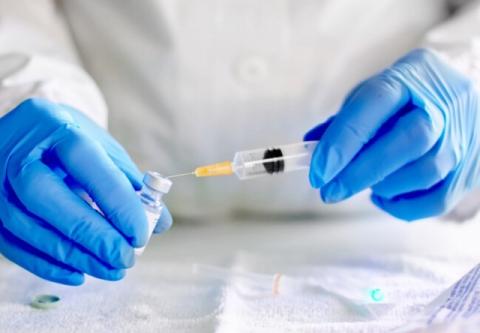Israeli Research Center to Announce It Developed Coronavirus Vaccine
According to medical sources, the scientists have recently had a significant breakthrough in understanding the biological mechanism and qualities of the virus, including better diagnostic capability, production of antibodies for those who already have the virus and development of a vaccine.
The development process requires a series of tests and experiments that may last many months before the vaccination is deemed effective or safe to use.
Asked about the development, the Defense Ministry said: "There has been no breakthrough in the efforts of the biological institute to find a vaccine for the coronavirus or to develop testing kits. The institute’s work is conducted according to an orderly work plan and it will take time. If and when there will be something to report, it will be done in an orderly fashion. The biological institute is a world-renowned research and development agency, which relies on experienced researchers and scientists with great knowledge and quality infrastructures. There are now more than 50 experienced scientists working at the institute on researching and developing a medical remedy for the virus."
The Institute for Biological Research, located in the central Israeli town of Nes Tziona, was established in 1952 as part of the Israel Defense Forces' Science Corps, and later became a civilian organization. It is technically under the supervision of the Prime Minister's Office, but is in close communication with the Defense Ministry. Prime Minister Benjamin Netanyhu ordered the institute to devote resources to developing a vaccine for COVID-19 on February 1.
Normally, a long process of pre-clinical trials on animals would be the next phase, followed by clinical trials. This period allows for a full characterization of side effects and a better understanding of how different populations are affected. Yet the global emergency over the coronavirus pandemic may accelerate this process in order to vaccinate as many people who are most at risk from the virus.
The development of an effective vaccine would end the global crisis caused by the virus; it would also protect the world’s population for a more serious outbreak next year, as some predict could happen.
According to a Ynet report, three weeks ago, five shipments of virus samples arrived in Israel from Japan, Italy and other countries. They were brought by a specially secured Defense Ministry courier to the Institute for Biological Research. The samples had been frozen to -80 degrees Celsius. According to health and defense sources, since the samples arrived, there has been intensive work, including by leading experts, to develop the vaccine.
The assessment of experts in Israel and abroad is that the length of time needed to develop a vaccine runs from a few months to a year and a half. Numerous research teams all over the world are participating in the race to develop a vaccine. Many of them at this point are focusing on the way the virus presents itself in animals, with the biggest hurdle being the way it morphs when it moves from animals to human beings.
Shortly after the outbreak started in January, China released the genetic sequence of the virus on open scientific databases so that research institutes and commercial companies could try to develop treatments and vaccines without needing to obtain samples.
Around a month and a half after the genetic sequence was published, biotechnology company Moderna, Inc., based in Boston, Massachussets, announced it had completed the development of a possible coronavirus vaccine. Immediately afterward the vaccine was sent to the U.S. National Institute of Allergy and Infectious Diseases, with clinical trials, which will include up to 25 health participants, to start in April and end in the summer. Any Israel vaccine will presumably also need to go through a similar or even stricter process before it will be approved for use.
Ido Efrati

